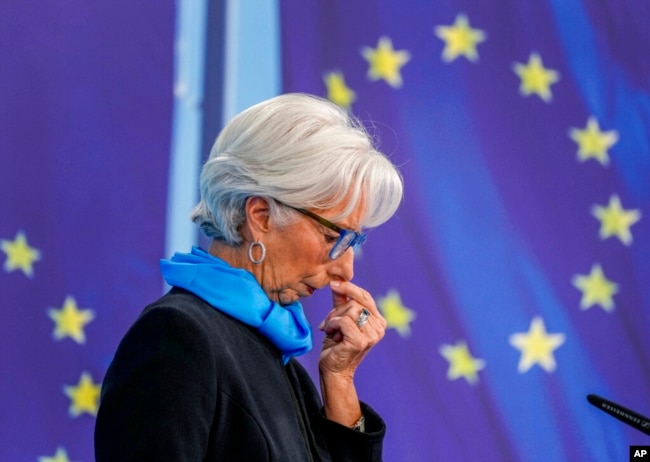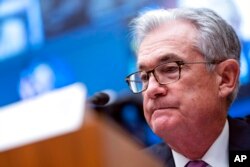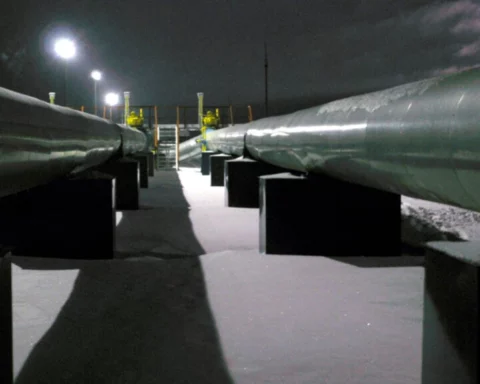WASHINGTON — Central bankers and government officials around the world are scrambling to convince both the financial markets and the general public that recent spikes in price inflation are temporary, and don’t signal a period of prolonged price hikes. But many are skeptical of their analysis.
Inflation is marked by the increase in prices across all sorts of different goods and services in an economy. While some inflation is normal, a high rate of inflation makes it difficult for people to afford essential things like cars, food, clothing and shelter.
Typically, people tend to blame the government for rising prices, which makes managing inflation an important task for politicians. In the U.S., for example, evidence of rising prices is currently being used by the Republican Party to criticize President Joe Biden, a Democrat, for his handling of the economy.
With the exception of much of Asia, most of the world has seen a significant surge in the cost of living since the coronavirus pandemic began in early 2020. The food price index maintained by the United Nations Food and Agriculture Organization is up 32.8% from last year. The cost of fuel of all sorts — gasoline, natural gas and coal — is on the rise globally.

On Thursday, data was released showing that Spain is experiencing an annualized inflation rate of 5.5%, and Germany is seeing 4.6% inflation. On Friday, a report covering the entire euro zone will be released, and economists expect it to show a regional 3.7% rate of inflation, the highest since the global financial crisis in 2008.
Across the globe, countries including Russia, Nigeria, Brazil and Turkey have reported inflation above — sometimes well above — 4%. In the United States, the Consumer Price Index maintained by the Bureau of Labor Statistics shows that overall prices increased by 5.4% in the 12 months ending in September.
Europe stays the course
Despite all this, most central bankers insist that the price spikes are a transitory reaction to the global economy opening up again after being largely shut down in the early stages of the pandemic.
“Recovering demand related to the reopening of the economy is outpacing supply,” European Central Bank President Christine Lagarde said in a virtual press conference on Thursday. “While the current phase of higher inflation will last longer than originally expected, we expect it to decline in the course of next year.”
She added, “We really looked and very deeply tested our analysis of the drivers of inflation, and we are confident that our anticipation and our analysis is actually correct.”

Lagarde’s remarks came after the European Central Bank signaled that it will keep interest rates at their current very low levels through next year.
That cuts against the advice of some high-profile economists, like former U.S. Treasury Secretary Larry Summers, who has called on the Federal Reserve and other central banks to begin tightening monetary policy, which was relaxed in response to the pandemic, in order to avoid a situation in which inflation gets out of control. Government bonds are currently trading at prices that suggest that markets believe interest rate hikes are inevitable.
Higher interest rates make borrowing more expensive and inhibit economic activity, slowing demand for goods and services. With reduced demand, prices tend to fall or moderate.
Bank of Japan unconcerned
In Japan, where the inflation spike affecting other countries has not materialized, Bank of Japan head Haruhiko Kuroda said that he doesn’t expect that to change. “I believe that the sort of inflation acceleration risk that’s been a cause of concern abroad is extremely limited in Japan,” indicating that he also expects the bank’s efforts to stimulate the economy to continue indefinitely.
Not all central bankers are as calm about inflation risks, though. Early this month, New Zealand’s central bank raised interest rates for the first time in seven years. In the United Kingdom, the Bank of England has signaled it is about to raise rates in order to keep inflation in check.
Around the world, bond markets are setting prices that suggest that market participants don’t believe most central banks will be able to stick to their promises that rates will remain at current low levels for a long time.
The situation in the U.S.
Federal Reserve board Chairman Jerome Powell admitted last week that the factors driving inflation, and particularly a global supply chain crisis, have not subsided as quickly as the Fed had expected.
“The risks are clearly now to longer and more persistent bottlenecks and thus to higher inflation,” he said at a virtual event hosted by the South Africa Reserve Bank. “We now see higher inflation and the bottlenecks lasting well into next year.”

He said that while the Fed will begin “tapering” a bond-buying program that was designed to push more cash into the U.S. economy during the pandemic, he doesn’t anticipate raising interest rates any time soon.
“I would say our policy is well-positioned to manage a range of plausible outcomes,” he said. “I do think it’s time to taper and I don’t think it’s time to raise rates.”
Joseph E. Gagnon, a senior fellow at the Peterson Institute for International Economics, said that he thinks the Fed is right to keep interest rates where they are for the time being, and that people who are warning that the U.S. is headed toward 1970s-style out-of-control price increases need a history lesson.
“Everyone remembers the bad old ’70s, when no one had any idea what inflation was going to be and every time inflation stepped up, people expected more and it just got out of control,” he said.
However, he said, “If you look at what led to that, it took five years of the Fed never fully responding to inflation, not talking about inflation, not doing its job, before that happened. In other words, it was a gradual process that took many years. And the Fed is just not going to let that happen. If inflation doesn’t come down next year, they are going to raise rates.”






